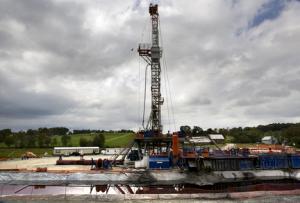Congressional Members Intensify Hydraulic Fracking Probe

Members of Congress sought records on Monday from 10 oil and gas producers about the safety of their hydraulic fracturing methods. The controversial, but rapidly growing, means of extracting natural gas has been implicated in a growing number of water pollution cases.
In a letter to well operators, Rep. Henry Waxman (D-Ca.), chair of the House Energy and Commerce Committee, and Rep. Edward Markey (D-Mass.), chair of the Subcommittee on Energy and Environment, demanded that they disclose the list of chemicals used in fracturing fluids and provide details on wastewater handling by August 6.
The request comes at a time when demand for natural gas is booming, and the hunt for unconventional sources trapped in shale reservoirs is widening.
The hottest venues are in Pennsylvania and New York State — home to the massive natural gas deposit called the Marcellus Shale — as well as the Barnett Shale in Texas and the Haynesville Shale in Louisiana.
But millions of acres of shale formations are ready to be tapped across Appalachia, Texas, Oklahoma, Louisiana, Arkansas, the Great Plains and western Canada. A widely cited 2009 study by consulting firm PFC Energy said that shale drilling has increased from 1 percent of U.S. natural gas production in 2000 to roughly 10 percent today.
It could hit 50 percent by 2035, according to a new report by IHS Cambridge Energy Associates, the Massachusetts research firm.
The key to the boom is hydraulic fracturing, known as "fracking." The practice involves blasting millions of gallons of water, chemicals, sand or plastic beads deep into horizontal wells to fracture the rock and release the gas.
After a 2004 investigation into the environmental effects of the practice, the Environmental Protection Agency ruled it safe. The 2005 Energy Policy Act exempted it from regulation under the Safe Drinking Water Act.
But the EPA study was seen by environmental groups and some lawmakers as an industry-friendly excuse for business as usual.
To date, there is no federal regulation of fracking, with the exception of a 2003 Memorandum of Understanding between EPA and hydraulic fracturing giants Halliburton, BJ Services and Schlumberger. Under the voluntary agreement, firms must stop injecting diesel into wells.
Waxman and Markey have said it's ineffective. Halliburton and BJ Services have continued to use diesel fluids, the representatives have noted, on top of other chemicals, such as benzene, toluene, ethylbenzene and xylene, which are all possible carcinogens.
For months now, the House committee has been gathering material to get some form of regulation on the books to ensure that fracking is not endangering drinking water.
"As we use this technology in more parts of the country on a much larger scale, we must ensure that we are not creating new environmental and public health problems," Markey said of the subcommittee's inquiry. "This investigation will help us better understand the potential risks this technology poses to drinking water supplies and the environment, and whether Congress needs to act to minimize those risks."
Since February 2010, Waxman and Markey have sent letters to 14 oil and gas service companies asking for data on the chemicals used in the drilling process. They also want information about the disposal of the tainted fluid after it is pumped back out of the well, among other issues.
But the companies passed the buck on certain questions.
"The hydraulic fracturing service companies informed us that they do not track whether the wells they fracture are located in underground sources of drinking water," Reps. Waxman and Markey explained in a memo accompanying the letter. "They said that the operators of the oil and gas wells would be more likely to maintain the requested information."
This week's letters are aimed at finally retrieving key records. They were sent to some of the nation's biggest energy and gas producers, including Encana Corporation, Occidental Petroleum Corporation, Chesapeake Energy Corporation, BP America, ConocoPhillips and ExxonMobil Corporation.
The committee requested the following information, and companies have until July 26 to notify lawmakers if they will comply on a "voluntary basis:"
- A list of all oil and gas wells engaged in hydraulic fracturing that are located near an underground source of drinking water, as defined by the Safe Drinking Water Act.
- A list showing the total volume of water recovered from the wells, and how the company disposed of the waste.
- A list of the firms' top producing natural gas wells that were hydraulically fractured in 2009, and all information related to potential contamination of water supplies at those sites.
- All tests performed to determine the chemical content of the water that was from the wells.
- All company policies, procedures and design standards
relating to on-site storage of
flowback and produced water.
- All documents relating to any allegations of harm to human health or the environment caused by hydraulic fracturing at the companies' wells.
In early 2010, in response to growing concerns, EPA announced that it would conduct a $1.9 million, two-year study into the potential adverse impacts of fracking on water quality and public health.
Copyright 2009, Science First, Inc. To subscribe or visit go to: http://solveclimate.com